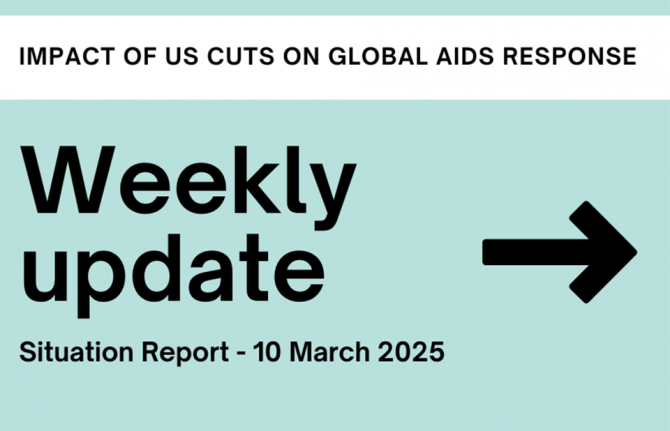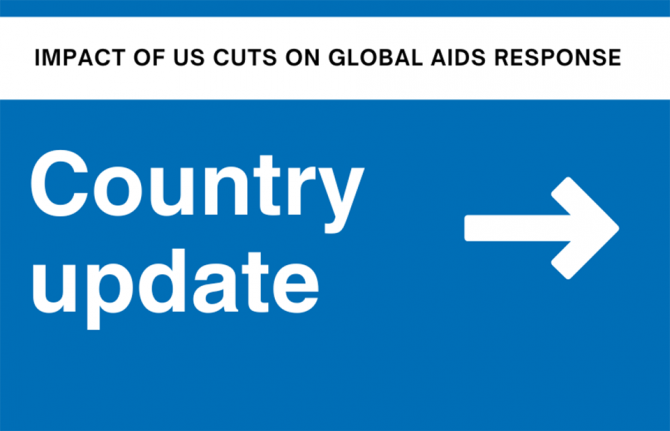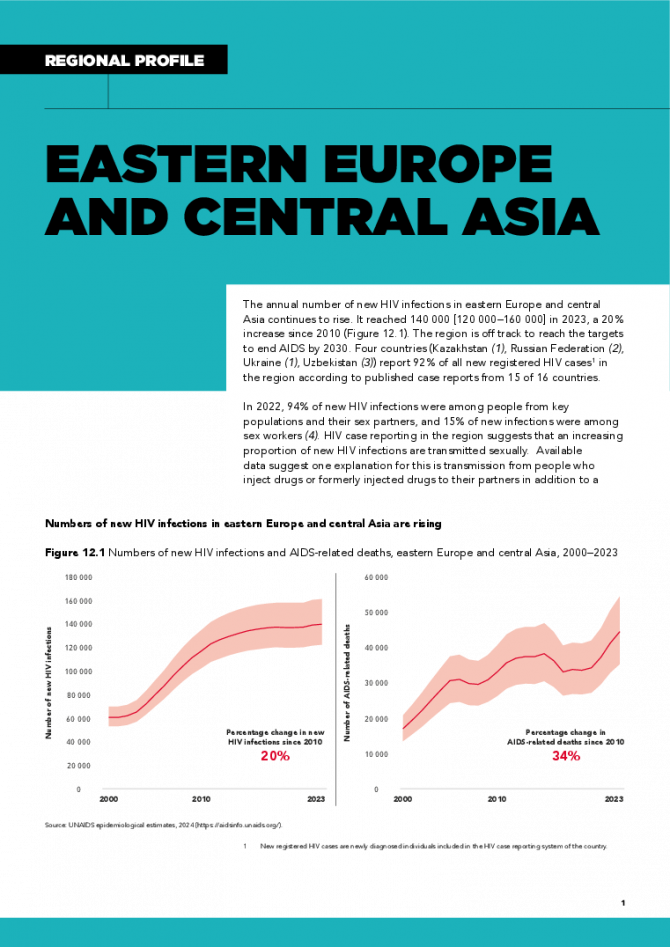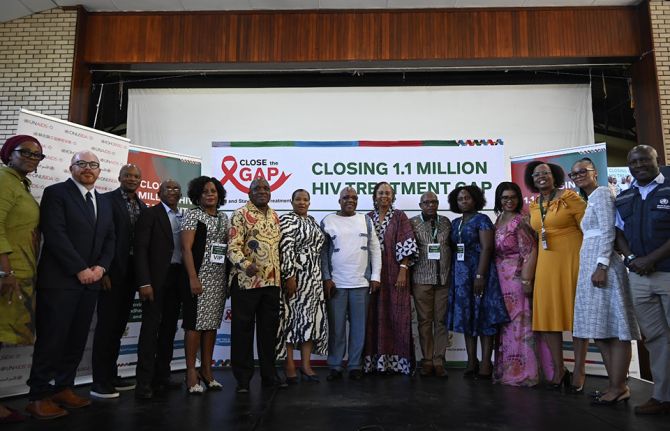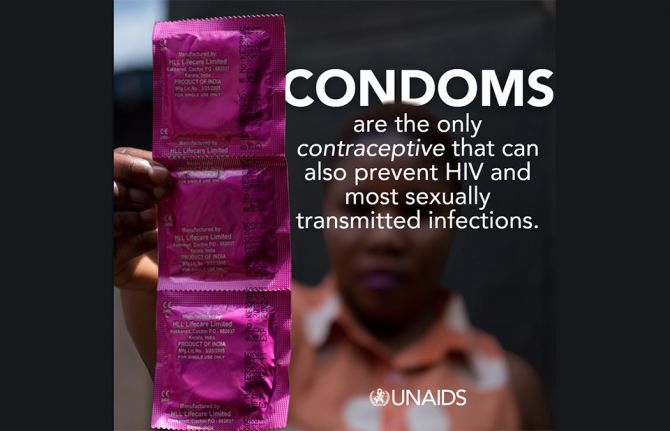Eastern Europe and Central Asia

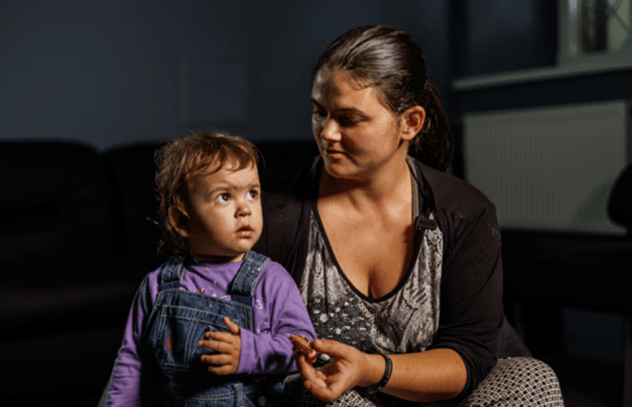
Feature Story
Three Years On: From crisis to prospective recovery
20 February 2025
20 February 2025 20 February 2025Ukraine has been reeling from three years of war since 24 February 2022. One out of two Ukrainians have been affected by the conflict and more than 12 million people need humanitarian assistance and protection while another 6 million have still not been able to return to their homes.
A war-driven economic crisis has severely impacted healthcare funding, putting access to HIV services at risk. With HIV services entirely dependent on external aid and humanitarian support that is becoming increasingly unstable, the uncertainty of the continuity of U.S. funding has further worsened an already dire situation in Ukraine. In January, the new U.S. Administration froze all foreign assistance for a 90-day period. A waiver to allow life-saving services was subsequently issued allowing support for some HIV services.
The U.S. President's Emergency Plan for AIDS Relief (PEPFAR) contributed US$15.6 million to the HIV response in Ukraine during 2023 and 2024. This includes $11 million for antiretroviral therapy and $2 million for various types of rapid test kits, while the rest was used for laboratory expenses.
UNAIDS and partners estimate that 92,840 Ukrainian people could see their HIV treatment disrupted if U.S. funding was to be entirely cut – that is 78% of all people living with HIV on treatment. In addition, stocks of life-saving treatment and HIV prevention drugs are low, with people only getting three versus six months of drug supply.
The threat of a potential financial void left by the U.S. is forcing Ukraine’s health system to search for alternative sources of funding. From Global Fund reprogramming to private sector donations to bulk medicine offers from pharmaceutical companies. Many options are being explored to patch together a lifeline. However, even collectively these efforts may not be enough to fill the PEPFAR gap should the U.S. permanently withdraw its support.
There are hopeful signs of recovery like HIV testing increased 23% last year compared to 2023 but obtaining comprehensive epidemiological and clinical data remains difficult.
This inevitably affects the accuracy of overall assessments due to the ongoing conflict, loss of administrative control in certain regions, missing persons, and mass displacement.
Despite ongoing challenges, Ukraine remains committed to the HIV response, supported by a strong coalition of government, civil society, international organizations, and donors. The UNAIDS Secretariat, Co-sponsors, UN agencies, and member states continue working together to ensure essential services for women, people living with HIV, and key populations, reinforcing the response's sustainability even in the face of adversity.
Related information
Special page
Region/country

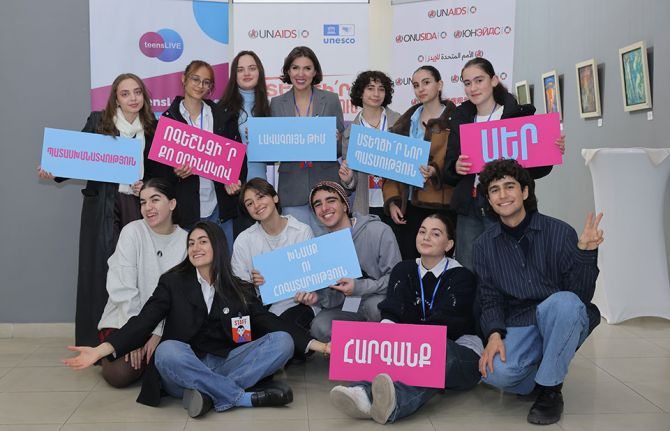
Feature Story
Promoting positive masculinity to end gender-based violence in Armenia
09 January 2025
09 January 2025 09 January 2025A new initiative in Armenia is redefining perceptions of gender roles to end gender-based violence in the country.
Gender-based violence remains a significant challenge in Armenia. Deeply rooted in societal norms and cultural attitudes, it disproportionately impacts women and girls, especially from marginalized and vulnerable groups, increasing their risk to HIV infection and reducing their ability to access HIV prevention and treatment services.
A recent study on perceptions of violence in Armenia, done with support from the European Union showed that, over the past year, more than 80% of women living with HIV or from other key populations reported experiencing violence from a spouse or partner. And a 2023 Gender Assessment report, supported by UNAIDS, stressed the prevalence of gender-based violence in Armenia and underscored the urgent need for actions to address harmful gender norms.
Addressing this issue requires a multifaceted societal effort, including legislation, policies, and cultural shifts. However, a critical component is redefining perceptions of gender roles and masculinity, starting at a young age. To that end, UNESCO and UNAIDS, with support from the Government of the Grand Duchy of Luxembourg launched The Joint Positive Masculinity Project. Addressed to young men aged 16–25, the initiative aimed to foster healthier attitudes toward masculinity, advancing gender equality and reducing violence.
The initiative used diverse and engaging digital content that resonate with young people, including articles, comics, and partnerships with influential local figures like sportsman Levon Hovhannisyan and actor Boris Melqonyan. These collaborations amplified the campaign’s message, sparking critical conversations about redefining masculinity.
A centerpiece of the initiative was a digital masculinity test, designed to challenge traditional views and encourage healthier attitudes. Nearly 2,000 young men participated, providing valuable insights. For example, harmful environments such as bullying, family violence, and misinformation were identified as key contributors to toxic masculinity, with 76.5% of respondents linking these factors to aggressive behavior and unhealthy gender norms.
Personal relationships with family and friends were shown to be the most influential in shaping positive masculinity, demonstrating the importance of interpersonal connections in fostering healthier attitudes.
Participants increasingly rejected harmful traits such as aggression and superiority over women, instead valuing emotional intelligence, care for others, and non-violence.
“The campaign sparked a crucial dialogue among Armenian boys and young men, empowering them to embrace a more inclusive and emotionally intelligent form of masculinity,” said Elena Kiryushina, UNAIDS Gender and Youth officer for the Eastern Europe and central Asia region. “The test results underscore the importance of addressing toxic behaviours in both media and social environments and demonstrate the potential for positive change.”
Through the project’s digital platform, young men openly discussed healthier masculinity, explored ways to manage stress, sought mental health support, and embraced non-violent behaviors. These efforts represent a significant shift toward creating healthier, more equitable gender dynamics.
The campaign achieved over 840,000 impressions across Instagram, Facebook, TikTok, and Telegram, far exceeding its initial targets and signaling a strong appetite for change among Armenian youth.
The campaign aligns with recent amendments to Armenia’s 2017 domestic violence law, which provide a more supportive environment for addressing harmful gender norms. By engaging adolescent boys and young men as agents of positive change, the project challenges entrenched stereotypes and promotes respectful, equitable relationships.
Ekaterina Samolygo, UNESCO IITE Project Coordinator, emphasized, “Gender equality is a fundamental human rights issue and a precondition for sustainable, people-centered development. This initiative is a significant step toward transforming unhealthy beliefs, attitudes, and behaviors to ensure gender equality.”
By empowering young men to redefine masculinity, the initiative lays the groundwork for a healthier, more equitable future for Armenia—one where respect, empathy, and gender equality flourish.
Region/country
Related
 Three Years On: From crisis to prospective recovery
Three Years On: From crisis to prospective recovery

20 February 2025

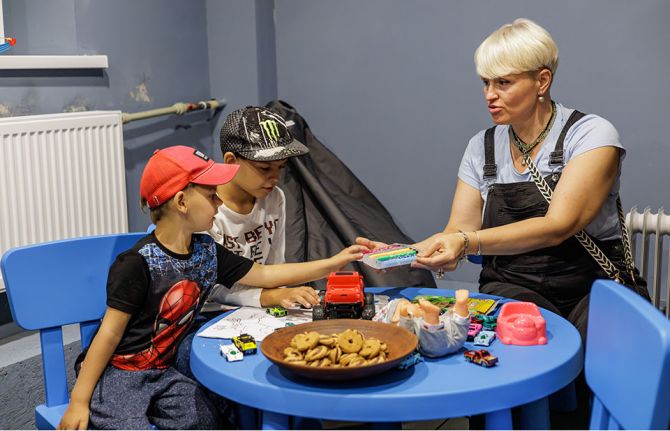
Feature Story
Club Eney: a safe place for those left behind
21 October 2024
21 October 2024 21 October 2024In the heart of Kyiv, Ukraine’s capital city, where the echoes of war resonate daily, the community-based organisation Club Eney stands as a refuge for key populations affected by the war.
For many, Club Eney is not just a place to receive assistance, but a vital community offering essential support.
When Yaroslav, a web developer, divorced a year and a half ago he spiraled out of control using drugs. Ultimately, he ended up homeless. "I used to have a steady job, but everything fell apart," he said. Without a place to call home, he now relies on the streets for survival. "I need food, a place to wash, and someone to talk to while I look for work," he explained.
A friend introduced Yaroslav to Club Eney, and it quickly became a part of his daily routine. "I receive food packages, do my laundry, and can take a shower," he said. He also enjoys a warm cup of tea or coffee while chatting with the staff, many of whom have faced their own struggles. "They’ve offered me sessions with a psychologist, but I’m not ready yet. I need to sort out my thoughts first," he admitted.
Velta Parkhomenko, chair of Club Eney, was once a client of the organization herself, receiving harm reduction services such as clean needles and support. "I started as a peer consultant and am now chair of the organization, so I refer to my experience helping others,” she said.
Club Eney began as a community-based organization offering HIV prevention services to people who use drugs and other HIV affected communities in Kyiv.
For her Club Eney is much more than that. "We had a dream to be a place where people could access all the services they need in one place, all in one location,” she said.
The organization has outreach workers in all districts of Kyiv, where they provide harm reduction services, HIV testing and other support. If someone tests HIV positive, they have someone accompany the person to the clinic, so they start treatment as soon as possible.
With the war, Club Eney has taken on a bigger role.
Olesya, a mother of three, fled from the Chernihiv region to Kyiv just before the war escalated. Having previously sought help at Eney for gender-based violence, she returned, knowing it would provide safety and help with basic needs.
“Today, my whole family came to Eney to do laundry, get food and diapers, and even have a social worker look after my children,” Olesya explained. Recently, when her child fell ill and she needed to buy medicine, the club reimbursed her for the costs after she presented the receipts. “With everything being so expensive, this support means a lot to us,” she said.
Since the onset of the war in February 2022, prices have skyrocketed for food, medicines and hygiene products and unemployment hovers above 17% pushing up demand at Club Eney and exacerbating other problems like drug addiction.
“In the last two years, we have provided help to over 40 000 people across the country. We are incredibly grateful that UNAIDS has supported us in filling the gaps and realising our dream," she said.
The Club Eney receives funding from the UNAIDS Humanitarian Fund, which supports various organizations, each addressing specific needs across different regions of Ukraine. Together, these projects enable local community organisations to deliver essential services, including HIV related services, and support to those who have been left behind, ensuring they receive the assistance they urgently need during this crisis.
“The war has greatly exacerbated social problems, pushing people from marginalized groups further to the edge of the state social system and leaving many without essential support. Thanks to the generous contributions from donors, primarily from the Netherlands, we can assist organizations like Club Eney in providing vital aid to these vulnerable populations,” said Gabriela Ionascu, UNAIDS Country director in Ukraine.
For Yaroslav, Club Eney has given hope. "I believe that everything will be okay for me because I see the people here at Club Eney who also used drugs but managed to turn their lives around,” he said. “So, I believe I can too."
Currently, there are over 3.4 million internally displaced people. A reported 143 591 people living with HIV were receiving treatment in 2023, close to the number before the invasion.
“Ukraine has succeeded in maintaining its HIV services, particularly the provision of antiretroviral therapy in government-controlled areas. However, the war, along with a range of humanitarian, social, and economic challenges, poses long-term risks to both the HIV response and the health system overall," said Eamonn Murphy, UNAIDS Regional Director for Eastern Europe and Central Asia. "To keep the epidemic under control, we must ensure that no one is left behind."
Related
 Three Years On: From crisis to prospective recovery
Three Years On: From crisis to prospective recovery

20 February 2025


Press Statement
UNAIDS statement on anti-LGBTQ+ legislation in Georgia
01 October 2024 01 October 2024GENEVA, 1 October 2024—UNAIDS expresses deep concern over the recently adopted anti-LGBTQ+ legislation in Georgia, which poses serious risks to public health and human rights.
UNAIDS supports the UN Office for the High Commissioner of Human Rights' statement that these laws will “impose discriminatory restrictions on education, public discussion, and gatherings related to sexual orientation and gender identity.”
These discriminatory laws violate fundamental rights to autonomy, dignity, and equality, exacerbating stigma and hindering LGBTQ+ people's access to essential health services. This undermines Georgia’s efforts to end AIDS and combat other infectious diseases.
UNAIDS reiterates that laws discriminating against LGBTQ+ individuals have no place in modern society. They lead to harassment, discrimination, violence and social exclusion, jeopardizing efforts to end the HIV epidemic. We call on Georgian authorities to repeal these harmful laws, as they will further isolate marginalized communities and worsen public health outcomes.
Stigma kills, but solidarity saves lives. Upholding the rights of LGBTQ+ people is crucial to advancing public health, social cohesion, and equality for all.
UNAIDS
The Joint United Nations Programme on HIV/AIDS (UNAIDS) leads and inspires the world to achieve its shared vision of zero new HIV infections, zero discrimination and zero AIDS-related deaths. UNAIDS unites the efforts of 11 UN organizations—UNHCR, UNICEF, WFP, UNDP, UNFPA, UNODC, UN Women, ILO, UNESCO, WHO and the World Bank—and works closely with global and national partners towards ending the AIDS epidemic by 2030 as part of the Sustainable Development Goals. Learn more at unaids.org and connect with us on Facebook, Twitter, Instagram and YouTube.

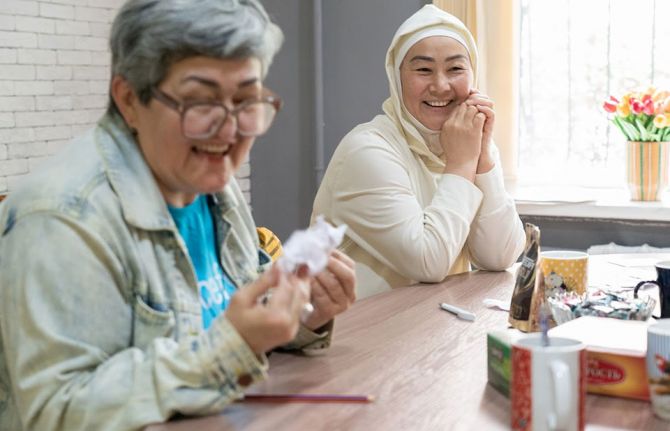
Feature Story
The power of women supporting women - Mentor program for women living with and affected by HIV in Kazakhstan
13 September 2024
13 September 2024 13 September 2024The Mentor programme for women in Kazakhstan was established to empower women living with or affected by HIV by connecting them with mentors who share their life experiences and provide critical support during challenging times. Co-financed by the Ministry of Foreign Affairs of the Republic of Kazakhstan and supported by UNAIDS, the program creates a safe space for women to learn, grow, and draw strength from one another. Through training seminars, support groups, and one-on-one mentoring, it helps women overcome stigma, rebuild their lives, and find their purpose.
Meet three inspiring leaders from this programme—women who never saw themselves as heroes but are, indeed, changing lives.
Halima
Several years ago, Halima found herself at a crisis center for women victims of domestic violence in Almaty, Kazakhstan. She was at rock bottom—diagnosed with HIV, grieving the loss of her second son, and trapped in an abusive marriage with a husband who drank heavily and often turned violent. Raised in a family that valued tradition, Halima felt compelled to keep the peace at all costs, but the weight of her daily life became unbearable.
At her lowest point, an elderly doctor’s advice pushed her into action: “If you want your eldest son to end up in an orphanage, your husband homeless, and you in a mental hospital, you are sadly following that path.” Determined to change her fate, Halima sought help at the crisis center, which she credits with helping her climb out of the “dark hole” of depression.
Today, Halima is helping other women in the mentoring programme. She shares her story with women, believing that her experiences can inspire others to seek life-saving HIV treatment and persevere.
At her lowest point, an elderly doctor’s advice pushed her into action: “If you want your eldest son to end up in an orphanage, your husband homeless, and you in a mental hospital, you are sadly following that path.” Determined to change her fate, Halima sought help at the crisis center, which she credits with helping her climb out of the “dark hole” of depression.
Today, Halima is helping other women in the mentoring programme. She shares her story with women, believing that her experiences can inspire others to seek life-saving HIV treatment and persevere.
"I make sure to give each person my undivided attention so I can explain in simple terms what HIV is, what an undetectable viral load means, and how to get better,” she says.
Her work extends beyond Almaty, reaching women in rural areas where information about HIV and access to services is limited. “I have no special education, but I love learning. While I’m cleaning or mopping the floors, I listen to psychologists and doctors on my headphones,” she says, knowing that every bit of knowledge helps her make a difference.
Lena
“This is a complex group,” says Lena from Pavlodar, Kazakhstan. She works with 17 women in a mentoring programme. Many of the women use drugs, have experienced domestic violence or have been in prison. Lena, aged 55, used drugs for over 20 years, but she has been drug-free for seven years, crediting opioid agonist maintenance therapy for helping her quit.
“I went through all this myself. I remember how it was using drugs: I fell asleep—it’s winter. Woke up—summer,” she says. “If a person comes to therapy out of desperation, does not want to steal or torment their parents and loved ones, this programme can help them.”
The therapy helps mitigate the need for drugs, but Lena emphasizes “it is important that peers and psychologists work with people and prepare them to leave the programme and have access to essential HIV prevention services and treatment”.
After being released from prison nearly a year ago, Lena became a peer consultant in the women’s mentoring programme.
“The problem for many people who use drugs is that they live with HIV and TB but cannot access available services or receive therapy,” Lena explains. Without a home or family, they are invisible to the social protection system and are often driven into desperate situations. “They need a helping hand. They are humans and live next to us."
Lena helps some people register for medical or social support facilities, and others to get treatment. She plans to meet with the akim (mayor) to propose a project to create a support system for people who are left behind. Lena believes there should be no situations where a person is alone and cannot be admitted to a home for disabled or elderly people because they are living with HIV. It is crucial to revise the laws so that everyone is allowed access to social institutions.
Lena is dedicated to the programme. “I am reborn from this work. My eyes light up, and I feel strong and ready to help,” she says.
Zulfiya
Zulfiya, a mother of three who has lived with HIV for nearly 20 years, uses her experience to support adolescents and young women in the program. “My task is to help them accept their diagnosis, start treatment, and stick to their medication,” she explains. She refers women to psychologists, social workers, or lawyers when additional support is needed. Zulfiya understands the denial many women face; she felt it herself two decades ago. Inspired by her son, an activist in the Teenager youth organization for adolescents living with HIV, she found her calling in guiding women who never thought HIV would touch their lives.
Connecting women with other women in a predominantly male-dominated society is the foundation of the mentoring program. “Women in Kazakhstan are often forced to solve a wide range of problems themselves, whether it’s financial difficulties, lack of help, or protection from violence,” says Elena Rastokina, coordinator of the Mentor Programme for Women. “They are not used to uniting in women’s communities, do not know how to ask for help, and often do not know their rights.” Despite the challenges, she is immensely proud of what the mentors have achieved. “When women support each other, they find strength they never knew they had. We need each other, and together, we can change lives.”
The mentoring programme covers 10 regions of the country. Dozens of women have received help. Some have learnt a new skill and found a job, and others have managed to accept their diagnosis and restore family ties. With help from the programme, many women who use drugs have managed to quit active drug use, improve adherence to life-saving HIV and TB treatment, and reconnect with the community.
For Aliya Bokazhanova, UNAIDS Country Director a.i. in Kazakhstan, these are incremental steps to empowering women from key populations. “Women living with HIV have the opportunity to develop and receive the necessary support and inspiration from experienced mentors, which contributes to their self-realization and integration into society,” she says.
As of 2024, there are an estimated 40 000 [35 000–46 000] people living with HIV in Kazakhstan. New HIV infections are mostly among people from key populations (people who use drugs, gay men and other men who have sex with men, sex workers, and people in prisons and other closed settings). HIV prevalence among people who inject drugs is almost 7%, compared with 0.3% in the general population.
Region/country
Related
 U=U can help end HIV stigma and discrimination. Here’s how
U=U can help end HIV stigma and discrimination. Here’s how

27 February 2025
 Three Years On: From crisis to prospective recovery
Three Years On: From crisis to prospective recovery

20 February 2025
Documents
Eastern Europe and Central Asia regional profile — 2024 global AIDS update The Urgency of Now: AIDS at a Crossroads
22 July 2024
The annual number of new HIV infections in eastern Europe and central Asia continues to rise. It reached 140 000 [120 000–160 000] in 2023, a 20% increase since 2010 . The region is off track to reach the targets to end AIDS by 2030. Four countries (Kazakhstan, Russian Federation, Ukraine, Uzbekistan) report 92% of all new registered HIV cases in the region according to published case reports from 15 of 16 countries. In 2022, 94% of new HIV infections were among people from key populations and their sex partners, and 15% of new infections were among sex workers. HIV case reporting in the region suggests that an increasing proportion of new HIV infections are transmitted sexually. Available data suggest one explanation for this is transmission from people who inject drugs or formerly injected drugs to their partners in addition to a growing recognition of transmission among men who have sex with men. Unsafe drug injecting practices are a key factor in the region’s epidemic, representing 27% of new HIV infections. Related links: New UNAIDS report shows AIDS pandemic can be ended by 2030, but only if leaders boost resources and protect human rights now | Full report
Related
 U=U can help end HIV stigma and discrimination. Here’s how
U=U can help end HIV stigma and discrimination. Here’s how

27 February 2025
 Three Years On: From crisis to prospective recovery
Three Years On: From crisis to prospective recovery

20 February 2025
Impact of community-led and community-based HIV service delivery beyond HIV: case studies from eastern and southern Africa
30 January 2025


Press Release
Stigma, criminalization and under-investment are driving worrying rises in new HIV infections in Eastern Europe and Central Asia
22 July 2024 22 July 2024MUNICH, 22 JULY 2024 – A new United Nations report released today shows that the HIV response in Eastern Europe and Central Asia is critically off track. Data in UNAIDS’ global report The Urgency of Now: AIDS at a Crossroads reveals that in this region, new HIV infections have risen by 20% and AIDS-related deaths have risen by 34%, since 2010. Only half of the 2.1 million people living with HIV in the region are accessing treatment, and only 42% of all people living with HIV in the region have suppressed viral load, the lowest rate globally. The report shows that it is still possible to end AIDS as a public health threat by 2030, but only if governments reform laws to protect everyone’s human rights and increase resources to ensure services are available for all.
“The promise to end AIDS is off track in Eastern Europe and Central Asia. But leaders can get on the path that ends AIDS. Programmes need to focus especially on people most affected by HIV, who are often the most marginalized and vulnerable. Community organizations need to be properly funded, supported and enabled to provide HIV services to people affected by HIV. The barriers of stigma and discrimination need to be broken down,” said Winnie Byanyima, UNAIDS Executive Director.
The new data shows that in 2023, there were 140,000 new HIV infections across the region, with 93% occurring in Russia, Ukraine, Uzbekistan, and Kazakhstan. Eight out of 13 countries in the region reported increases in new infections.
Because stigma, discrimination and harmful punitive laws obstruct marginalised communities’ access to vital services, 94% of new infections were among people from key populations - including men who have sex with men, people who inject drugs, and sex workers - and the sexual partners of people from key populations. Only 58% of sex workers, 43% of gay men, 52% of people who inject drugs, and 65% of transgender people receive HIV prevention services. Only 12% of resources are dedicated to prevention programmes for key populations.
The criminalization of small amounts of drug possession for personal use, of sex work, and of HIV transmission and exposure, are driving the people most in need underground and out of reach of HIV services. All 16 countries in the region criminalize sex work, 13 criminalize the non-disclosure, exposure, or transmission of HIV, and 7 criminalize small amount of drug possession for personal use. Studies show criminalization increases HIV prevalence among key populations. Unless countries can ensure fear-free access to HIV prevention services for everyone, new infections will continue to grow.
“Restrictive legal environments and stigma are obstructing progress in the region,” said Eamonn Murphy, UNAIDS Regional Director for Eastern Europe and Central Asia and Asia Pacific. “Restrictive laws, along with aggressive policing and stigma, push people away from medical care. If people are pushed underground, the HIV response will not succeed.”
Powerful prevention technologies like PrEP are also not widely accessible for the same reason. Criminalization fuels stigma, with many avoiding medical care due to discrimination. Nearly half of people surveyed who inject drugs in Kyrgyzstan and 32% of people living with HIV in Tajikistan reported avoiding medical care due to stigma and discrimination. UNAIDS data shows that people in key populations are experiencing high levels of violence.
"Supporting the leadership of communities is essential for reaching marginalised people providing vital outreach services. Without community leadership and the integration of community services into the health system, reaching these groups is too difficult," said Yelena Rastokina, lead of the ‘Answer-Kazakhstan’ Association.
Recent years have seen worrying restrictions of civic space and limits to communities’ involvement in public health initiatives, including those related to harm reduction, access to public health services for LGBTQ+ people, sex workers and other marginalised people. Restrictive systems at local, national, and regional levels are holding back communities’ contribution to public health.
Ganna Dovbach, Executive director of the Eurasian Harm Reduction Association, highlighted: “The shrinking of civic space and attacks on human rights threaten our response to HIV, which is based on community-led or civil society provided services. Addressing these interconnected issues is essential for a sustainable response to the AIDS epidemic in our region.”
The region’s HIV response has also been hurt by the war in Ukraine.
But despite the conflict, Ukraine remains committed to its HIV response. Through a strong coalition of the government, civil society, international organizations and donors, HIV services have been maintained, with 143,600 people receiving treatment in 2023. This collaboration has ensured vital supplies of antiretroviral and tuberculosis medicine, and opioid agonist therapy, contributing to uninterrupted HIV treatment and other services. As of January 2024, 7,900 Ukrainian refugees in other countries and 1,900 returnees were accessing antiretroviral therapy.
Many community organizations working on HIV in Ukraine refocused their efforts to addressing humanitarian issues and supporting community members while continuing national advocacy for access to HIV services and the protection of human rights.
With support from the UNAIDS and other donors ALLIANCE.GLOBAL oversees a network of five specialized shelters across the country, providing shelter, humanitarian aid, and access to specialised services, including HIV prevention and treatment, for key populations and LGBTQ+ people who are internally displaced.
Despite the war, ALLIANCE.GLOBAL together with other community-led organisations continue advocating for laws that better protect LGBTQ+ people from intolerance and from hate crimes, to enhance access to public health services, including HIV-related services.
UNAIDS new report calls on leaders to develop sustainable plans for the HIV response to2030 and beyond. These plans should include enabling legal environments, support for community-led response and a boost in domestic funding. Repealing laws and norms that prevent people from accessing services is crucial.
“Ensuring access to services and treatment for all is how we end AIDS,” said Mr Murphy.
UNAIDS
The Joint United Nations Programme on HIV/AIDS (UNAIDS) leads and inspires the world to achieve its shared vision of zero new HIV infections, zero discrimination and zero AIDS-related deaths. UNAIDS unites the efforts of 11 UN organizations—UNHCR, UNICEF, WFP, UNDP, UNFPA, UNODC, UN Women, ILO, UNESCO, WHO and the World Bank—and works closely with global and national partners towards ending the AIDS epidemic by 2030 as part of the Sustainable Development Goals. Learn more at unaids.org and connect with us on Facebook, Twitter, Instagram and YouTube.
Region/country

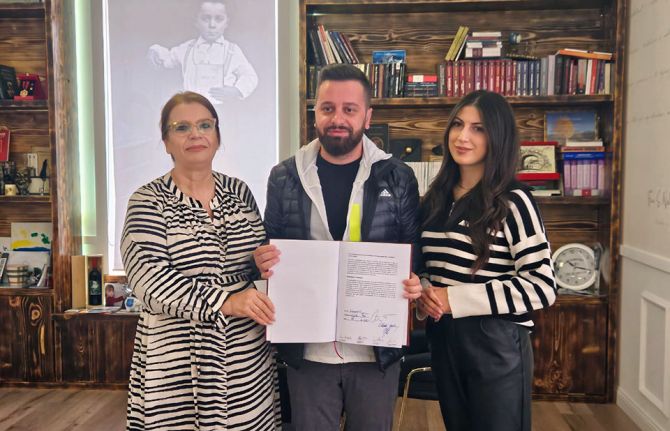
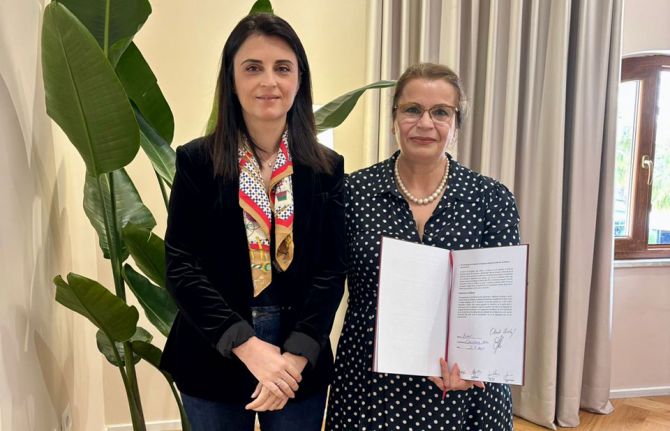
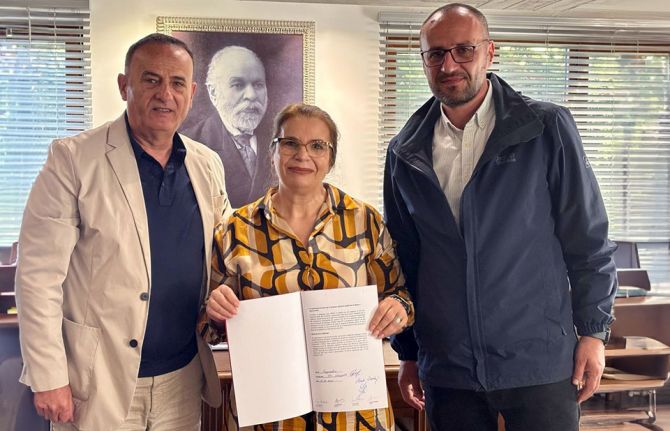
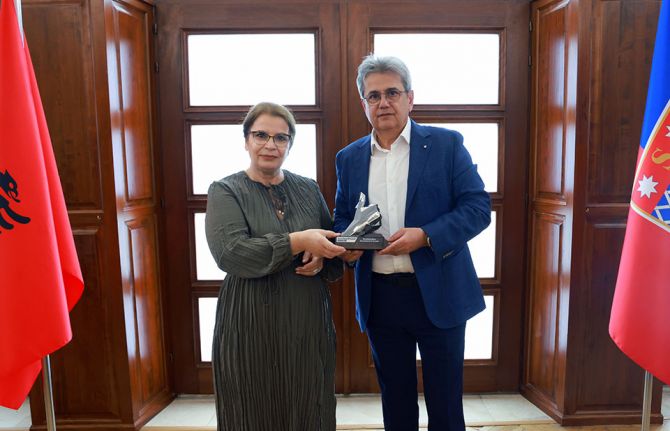
Feature Story
Four Albanian cities commit to ending the AIDS epidemic by 2030
19 June 2024
19 June 2024 19 June 2024Four Albanian cities—Kolonja, Durrës, Pogradec, and Shkodra—have signed the Paris Declaration on AIDS committing to ending AIDS as a public health threatby 2030. By signing the declaration, the Mayors committed to achieving the 95-95-95 targets by 2025 and called on other municipalities in Albania, including the capital Tirana, to join this effort.
The Albanian cities are the latest additions to the list of more than 550 other cities around the world that are part of the Fast-Track Cities initiative which aims to fast-track action at local level to improve the quality of life of people living with and affected by HIV.
In order to fulfill their commitments, the cities have developed different plans of action based on their local circumstances. For instance, the Municipality of Durrës plans to increase investments in methadone maintenance therapy, aiming to expand the number of people benefiting from such services by 10% each year.
The Municipalities of Pogradec and Kolonja are focused on raising awareness among migrant populations to increase HIV testing rates in these regions. As border cities with a significant male population migrating for work, ensuring these communities are well-informed and have access to necessary health services is crucial.
Finally, the Municipality of Shkoder aims to foster a partnership with Podgorica in Montenegro to exchange experiences and best practices in developing the "Healthy Houses" model, which has been successful in the neighboring country. The "Healthy Houses" initiative is a free social service providing psychosocial support to citizens. It focuses on improving the quality of life, reducing risks, and offering support to socially vulnerable groups. The service addresses a range of issues, including HIV, domestic violence, addiction, services for LGBTQ+ peopleand others.
Olimbi Hoxhaj, Executive Director of the Albanian Association of People Living with HIV, hopes that signing the Declaration and the follow-up actions will not only help prevent new HIV infectionsbut will also significantly reduce AIDS-related mortality.
Albania has a low HIV-prevalence epidemic but faces an increasing number of new HIV cases. From 1993 to 2023, 1,716 cases were diagnosed, with 113 new cases in 2023 alone. Most HIV testing occurs in the late stages of infection (about 60% of new cases), meaning official figures do not fully represent the actual infection rate.
The Minister of Health and Social Protection of Albania, Ogerta Manastirliu, emphasized that rapid diagnosis and treatment are key. “The whole fight in this aspect is timely diagnosis so that the treatment can start as soon as possible, and the infection is under control.”
“While the European region continues to face political, economic, and healthcare challenges due to regional conflicts, migration, and other complexities, it is important to secure commitment from municipalities to advance progress towards the crucial HIV targets,” said Eamonn Murphy, UNAIDS Regional Director for Asia-Pacific and Eastern Europe and Central Asia.
Technical assistance to all municipalities in developing their local programs was provided through the cooperation between the International Association of AIDS Care Providers (IAPAC), the Fast-Track Cities Institute (FTCI), UNAIDS and the Global Fund’s regional #SoS 2.0 project, which aims to ensure the sustainability of HIV services in 15 countries in Eastern Europe. "Since 2019, with our support, 21 municipalities from Southeast Europe have joined the Fast-Track Cities initiative," said Tetiana Deshko, Director of the International Programs Department at the Alliance for Public Health.
Learn more
Region/country
Related

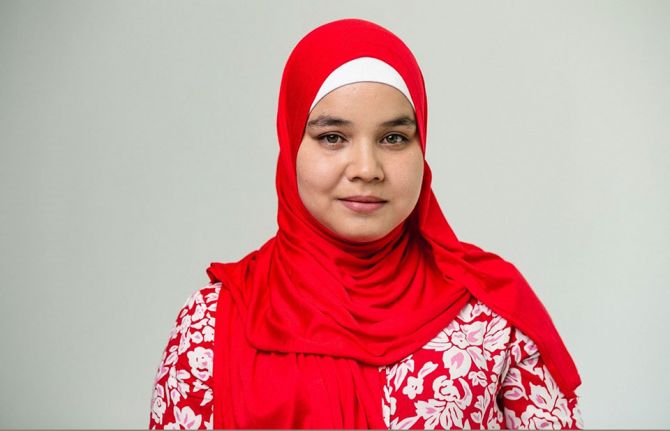
Feature Story
Meet Azima: Frontline hero of the HIV response in Uzbekistan
27 May 2024
27 May 2024 27 May 2024Azima has lived with HIV since childhood; she was abandoned by her parents and raised by her grandmother.
Today she is recognized as an inspirational community leader in the HIV response, including for the vital role she has played in tackling stigma as the first young woman in Uzbekistan to disclose her HIV-positive status.
"I am strong. I have a bright future ahead. And I will achieve my goals,” says Azima.
She has faced both positive and negative reactions since her disclosure. Throughout, Azima has remained a committed activist. She is especially thankful to her community of peer support, a group of children and young people living with HIV supported by UNICEF.
“In the end, the energy of the people who supported me was so strong that it helped me rise above other people's criticism,” she said.
As a peer educator, Azima works tirelessly to raise awareness about HIV.
Today, Azima is studying psychology at Fergana State University. This choice of future career was encouraged by her grandmother and inspired by a psychologist who worked in her support group.
Because of her HIV treatment, Azima cannot transmit HIV to her husband. Several months ago, she gave birth to an HIV-free baby girl.
She is thankful for her family. “My husband has always supported me,” says Azima.
Azima’s story exemplifies the progress made in Uzbekistan’s HIV response. Antiretroviral therapy is provided free of charge to all in need in Uzbekistan. The country is also making efforts to ensure all women living with HIV receive timely treatment, so that all babies will be born HIV-free. Coverage of pregnant women who receive antiretroviral treatment to prevent vertical transmission of HIV has been around 98% since 2016, according to the Uzbekistan Republican Center to fight AIDS.
“The rate of vertical HIV transmission in 2023 was 0.2%. We aim to reduce this figure to 0%. The Republic of Uzbekistan is on the verge of receiving an international certificate for the elimination of mother-to-child HIV transmission,” said Bahrom Igamberdiyev, Director of the Republican AIDS Center in Uzbekistan.
The country has approved a "Roadmap for Implementing Measures to Achieve the Validation of the Elimination of Mother-to-Child Transmission of HIV for 2024-2026". This roadmap will be implemented with the participation of all partners, allowing Uzbekistan to reach its goal and obtain validation for the elimination of vertical transmission of HIV. An effective HIV response is a priority for both the government and civil society in Uzbekistan.
However, some critical challenges in the HIV response in Uzbekistan, particularly concerning HIV prevention, which are deeply rooted in societal norms and systemic inequalities.
These, according to the recently released Gender Assessment Report for Uzbekistan, include limits on women's decision-making power, leaving many women dependent on male relatives for important life choices, including healthcare decisions.
Despite the Government’s commitment and legislative efforts to address gender-based violence, underreporting remains a significant issue. The prevalence of early and arranged marriages also contributes to the limited autonomy of women, depriving many of them of educational and economic opportunities and impeding access to comprehensive sexual education. Cultural norms limit open discussions on reproductive health and prevention in many social contexts including family and educational settings.
As a result, the latest survey found that only 14% of women between 15 and 49 years old have comprehensive knowledge about HIV. This reduces to 10% for young women between 15 and 25 years old. “Addressing these systemic issues requires comprehensive efforts to promote gender equality, ensure access to sexual and reproductive health and rights, and empower women economically. UNAIDS is working with partners to improve access to education and create an enabling environment for women to realize their full potential,” said Eamonn Murphy, UNAIDS Regional Director for Asia-Pacific and Eastern Europe and Central Asia.
Azima is stepping up her advocacy role, pointing out that openness and education are crucial in fighting stigma and advancing access to prevention, testing and treatment. She advises young women to disclose their HIV status to partners early in relationships and emphasizes the importance of adherence to treatment and of mutual support within families.
Azima will continue breaking stereotypes, promoting awareness, and embracing her journey with courage and determination. Azima exemplifies the learning that HIV responses succeed when we let communities lead.
Related link
Region/country
Related

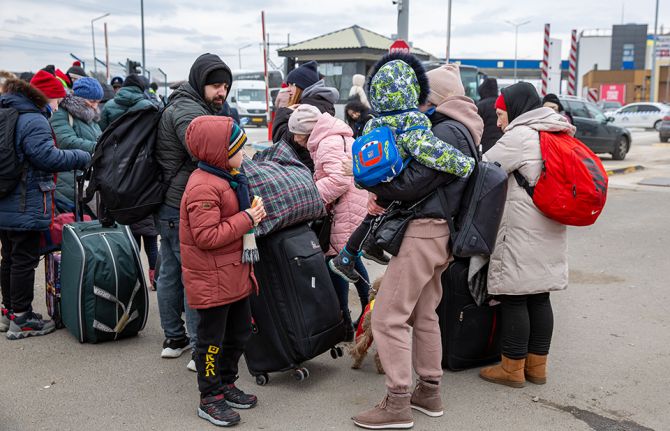
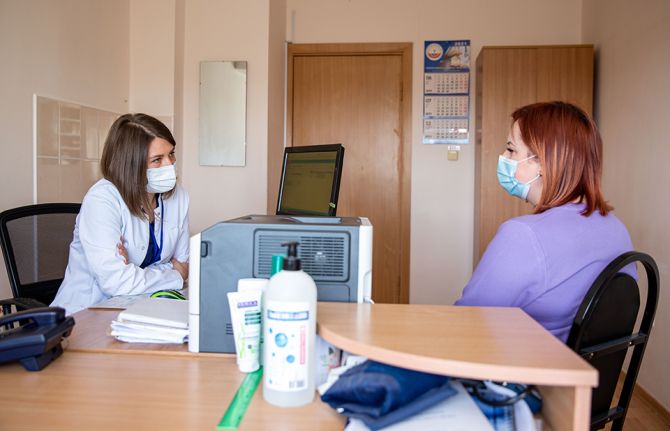
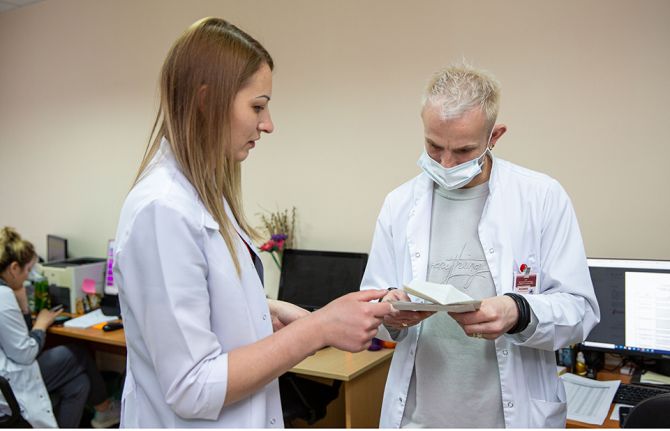
Feature Story
Navigating HIV services during migration crisis in Eastern Europe and Central Asia
17 April 2024
17 April 2024 17 April 2024Countries affected by the migration crisis in Eastern Europe and Central Asia, prompted by the war in Ukraine and other turmoil in the region, have had to put in place measures so that all displaced people have access to essential HIV services.
Key Figures:
- In 2022, Europe was confronted by the largest refugee crisis since World War II.
- As of February 2024, nearly one-third of Ukraine’s population remains displaced, with 6.3 million Ukrainian refugees globally, primarily concentrated in Europe, 62% of them are women.
- In 2022, around one million Russian citizens emigrated, with many choosing prolonged stays abroad.
- Central Asian countries witnessed the biggest influx of international migrants since their independence.
- Up to 300,000 Belarusians left their country since May 2020.
- Migration from Central Asia to Russia surged in 2023, with notable increases in Uzbek, Kyrgyz, and Tajik nationals entering for work purposes. (ICMPD Migration Outlook Eastern Europe and Central Asia 2024)
- The HIV epidemic is growing in Eastern Europe and Central Asia, with Russia, Ukraine, Uzbekistan, and Kazakhstan accounting for 93% of new infections in the region combined.
Surviving the devastating events of March 2022 in Mariupol, Ukraine, uncertain of what the future held, Svetlana fled her hometown.
"Mariupol was a scene of utter destruction. I had a packed suitcase, but I left it behind, only taking with me a dog and a cat," recalls Svetlana. "With assistance, we managed to reach the Polish border, eventually finding refuge in Lithuania."
Living with HIV since 2000, Svetlana relies on anti-retroviral treatment (ARV) to keep the virus at bay by taking a tablet a day. In haste, she had only taken one pill box.
Upon her arrival in Lithuania, she connected with an online organization that within days helped her to obtain her life-saving medicine from a doctor.
Svetlana is one of 70 participants in 6 countries in the Regional Expert Group on Migration and Health (REG) study that assessed the healthcare access for Ukrainian refugees using qualitative methods. According to Daniel Kashnitsky, the lead REG expert, “insights from specialists and service recipients revealed that all HIV-positive refugees had access to treatment across EU host countries.”
After recovering from the initial shock, the European Union activated the Temporary Protection Directive, establishing legal guidelines for managing mass arrivals, offering humanitarian aid, and ensuring access to life-saving antiretroviral treatment and basic HIV services to those in need.
Outside the EU, in countries like Moldova and Georgia, special regulations ensure free access to HIV services. Moldova's National AIDS Coordinator, Yuri Klimaszewski, underscored that Moldova provided HIV services to refugees like it does for its citizens.
The study also revealed that some refugees struggled in host countries, leading to challenges maintaining treatment adherence. Tatyana (name changed) left Odessa along the Black Sea in April 2022.
But she returned home because she could not find adequate support under the opioid maintenance therapy program in Poland. She found it complicated to reach the service point, the language barriers prevented her from communicating her needs with medical staff, and she lacked community support.
“Despite the unprecedented support shown by European countries to Ukrainian refugees, systemic issues, particularly bureaucratic complexities, require proactive intervention by social workers, community organisations and volunteers to effectively address these challenges,” said Mr Kashnitsky. Additionally, he added, “there is a pressing need to tackle the stigma faced by people living with HIV and other key populations, such as people who use drugs.”
Uladzimir, who left Belarus for Poland in the first days of the war in Ukraine, needed about a month to start receiving ARV treatment. First, he had to obtain "international protection", then confirm his HIV status and wait for an appointment with a doctor. But once all that was cleared, he had access to all the necessary services. For many accessing services is not as straightforward as it is for Ukrainian refugees, according to the REG study “Forced migrants with HIV status: social psychological and medical aspects of adaptation”
Legislation in some countries makes accessing HIV prevention and treatment for migrants challenging. And in some cases, national healthcare systems may lack resources to meet the influx of people and their needs.
As the Russian Federation continues to deport migrants living with HIV, those who remain in Russia due to the inability to return home or for family reasons are compelled to stay in the country illegally. They are deprived of HIV treatment and health services. Some have succeeded by receiving treatment remotely (ARVs sent to them with the help of countries of origin).
Recommended strategies, as outlined by the REG study, include improving the system of informing people about potential risks and available HIV services abroad, establishing health insurance protocols, and supporting community organizations that provide HIV services.
Removing legal provisions that discriminate against migrants living with HIV will also reduce barriers to accessing antiretroviral therapy, resulting in significant improvements for public health in the region.
Eamonn Murphy, UNAIDS Regional Director for Asia Pacific and EECA regions, praises the collaborative efforts involving various stakeholders, including governments of countries of origin and host countries, community organizations, the Joint UN Programme on AIDS, and donors.
However, he says more needs to be done. “There is an urgent need to work on the legalization and standardization of such approaches to ensure all people on the move can access essential services and remain on treatment wherever they are.”
Region/country
Related
 Three Years On: From crisis to prospective recovery
Three Years On: From crisis to prospective recovery

20 February 2025

